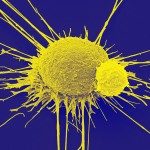Link to Pubmed [PMID] – 16243487
J. Autoimmun. 2005;25 Suppl:56-62
Immunodysregulation, Polyendocrinopathy, Enteropathy, X-linked (IPEX) syndrome is a rare inborn error of immune regulation characterized by the early onset of one or more autoimmune diseases in boys. IPEX is caused by mutations in FOXP3, and is thus the homologue of the scurfy mutant mouse. The gene product, Scurfin, is required for the development of CD4+CD25+ T regulatory cells. In the absence of T regulatory cells, activated CD4+ T cells instigate multi-organ damage resulting in type 1 diabetes, enteropathy, eczema, hypothyroidism, and other autoimmune disorders. While effective therapies are currently limited, studies in the scurfy mouse are revealing aspects of pathophysiology and genetics that will lead to novel approaches for treating IPEX and other autoimmune disorders. Females carrying Foxp3 mutations are unaffected. In new experiments we show that female scurfy mice that are also heterozygous in trans for the X-linked recessive common gamma chain knockout contract autoimmune disease, proving that murine Foxp3 is subject to X-inactivation and providing an example of gene-gene interaction causing autoimmune disease in females. One explanation for the lesser disease severity in these females is proposed.

